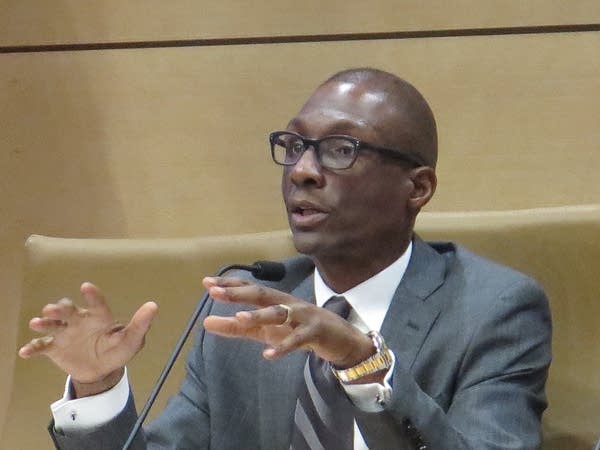Lawmakers clash over racial disparities special session fix

Go Deeper.
Create an account or log in to save stories.
Like this?
Thanks for liking this story! We have added it to a list of your favorite stories.
Gov. Mark Dayton and top lawmakers will meet again Friday in another attempt to agree on an agenda for a special legislative session. The two sides appear to be far apart as the governor's deadline nears.
But special session or not, lawmakers in both parties agree that at some point they need to address a serious issue facing Minnesota — the widening racial disparities in poverty and unemployment.
Minnesotans of color have long lagged behind whites in many quality of life measures, from education to home ownership to income. But a Census Bureau report last September found those gaps are getting even wider.
From 2013 to 2014 median household income for African-Americans in Minnesota plunged nearly 13 percent, to just over $27,000 a year. That drop came even as overall median annual income in the state rose slightly to more than $61,000.
Turn Up Your Support
MPR News helps you turn down the noise and build shared understanding. Turn up your support for this public resource and keep trusted journalism accessible to all.
At a legislative working group hearing on economic disparities Thursday state demographer Susan Brower said this could have major consequences for the state's economy. Brower said that's because Minnesota's minority populations are growing even as workforce growth slows amid a wave of baby boomer retirements.

"Looking forward in the next 10 to 20, 30 years, it becomes very clear that we're going to need to have to utilize every potential worker to their fullest ability," Brower said. "And under these conditions Minnesota can't afford to waste any human potential."
Brower also pointed out that at 38 percent, the poverty rate for black Minnesotans is more than three times the state's overall rate. And even though unemployment for African-Americans dropped slightly in 2014, that's largely due to an increase in part-time, low-wage jobs.
State Sen. Bobby Joe Champion, DFL- Minneapolis, said there's no single solution. He likens it to managing a chronic illness.
"It's not just — you take a pill today and it's over," he said. "You got to manage it, you got to understand what are the contributing factors. It's like having diabetes."
Champion, who's co-chair of the economic disparities working group, has drafted a 57-page proposal that includes fast-track GED programs, workforce development efforts and financial literacy initiatives, all aimed at combating poverty.
He said a key piece of his plan is a revolving loan fund for minority business development.
"The empirical data already suggest that minority-owned businesses hire other people that look like them. How do we remove those impediments such as capitalization or growth?"
The group's other co-chair, state Rep. Jim Knoblach, R-St. Cloud, expects bipartisan support for addressing racial disparities.
"People have different ideas about what's causing this. People have different ideas about how to solve it," he said. "Obviously, people have a lot of differences on some of those things. I think we'll be able to find some common ground, but we just have to start the process and see where we end up."
Knoblach said the issue is far too big to deal with in a one-day meeting of the Legislature, but said lawmakers should certainly take it up when they have more time.
Dayton also wants a special session to focus on an extension of unemployment benefits for out-of-work Iron Range steelworkers as well as an overhaul of Minnesota drivers licenses to bring them in line with stricter federal ID requirements.
He's expected to meet Friday morning with Senate Majority Leader Tom Bakk and House Speaker Kurt Daudt.
This week, the Republican speaker downplayed prospects for a special session, saying the DFL governor's proposals are light on details.


